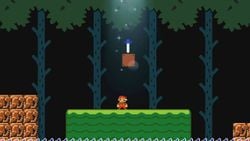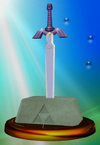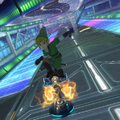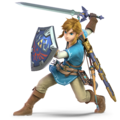Master Sword: Difference between revisions
No edit summary |
|||
| Line 21: | Line 21: | ||
===''WarioWare'' series=== | ===''WarioWare'' series=== | ||
The Master Sword appears as the focus of the [[Ocarina of Time]] microgame in ''[[WarioWare: Smooth Moves]]''. To win the microgame, the player must make Young Link pull the Master Sword from its pedestal in the Temple of Time. If the microgame is won, Young Link will either turn into his adult form, an old man, or a Cucco. This microgame returns in ''[[WarioWare Gold]]''. | The Master Sword appears as the focus of the [[Ocarina of Time]] [[microgame]] in ''[[WarioWare: Smooth Moves]]''. To win the microgame, the player must make [[Young Link]] pull the Master Sword from its pedestal in the Temple of Time. If the microgame is won, Young Link will either turn into his adult form, an old man, or a [[Cucco]]. This microgame returns in ''[[WarioWare Gold]]''. | ||
===''Mario Kart 8'' / ''Mario Kart 8 Deluxe''=== | ===''Mario Kart 8'' / ''Mario Kart 8 Deluxe''=== | ||
Revision as of 23:21, February 27, 2021
Template:Item-infobox The Master Sword is a recurring weapon originating from the The Legend of Zelda franchise. It is the legendary sword capable of repelling and sealing evil ones who will try to steal and use the Triforce for their designs. Waiting to be pulled out of its pedestal, only a hero who has proven their worth can use it, with the sword choosing and accepting the wielder as its master.
In crossovers with the Mario franchise, the Master Sword appears along with its wielder, Link, in games such as the Super Smash Bros. titles and Mario Kart 8, in addition to appearing as a standalone power-up in Super Mario Maker 2.
History
Super Mario-Kun
While the Master Sword itself does not appear in Super Mario-Kun, a sword that parodies the Master Sword called the Kinoko Sword (alongside an upgraded version called the Master Kinoko Sword) appears instead.
Super Smash Bros. series
Link wields the Master Sword in all Super Smash Bros. games, along with Toon Link in Super Smash Bros. Brawl and up. They use the sword in a multitude of moves, mostly those that are standard attacks. As of Super Smash Bros. Ultimate, Link's Master Sword is able to fire Sword Beams when Link uses his forward smash at 0%.
In addition, the Master Sword appears in Super Smash Bros. Melee as a trophy, which can be obtained when it appears at random in one of the game's single-player modes.
The Master Sword plays a small role during the Adventure mode of Super Smash Bros. Ultimate. It awaits the player in a pedestal at the center of the Sacred Land, though Cloud must be awoken before reaching it. Once pulled from its pedestal, the sword emits a glow that dispels the darkness shrouding the northern part of the land, making it accessible.
WarioWare series
The Master Sword appears as the focus of the Ocarina of Time microgame in WarioWare: Smooth Moves. To win the microgame, the player must make Young Link pull the Master Sword from its pedestal in the Temple of Time. If the microgame is won, Young Link will either turn into his adult form, an old man, or a Cucco. This microgame returns in WarioWare Gold.
Mario Kart 8 / Mario Kart 8 Deluxe
In Mario Kart 8 and Mario Kart 8 Deluxe, the Master Sword rests in a pedestal at a crossroad inside the Hyrule Castle in Hyrule Circuit. It acts as a Spin Boost Pillar, but is initially inaccessible. On the track leading to the sword, there are three spin boost crystals that, when activated, cause the sword to rise up from the pedestal along with a Dash Panel ramp that allows racers to go through it and receive a spin boost. The Master Cycle bike is heavily based off of the Master Sword.
Link also pulls out the Master Sword during two of his tricks.
Super Mario Maker 2
The Master Sword was added in the version 2.0 update in Super Mario Maker 2, where it serves as a power-up only available in the Super Mario Bros. style, obtainable as an alternate form of the Super Mushroom. When the item comes out of a ? Block, it plays the "item appear" sound effect from the Disk System version of the original game. When the item is collected, it plays the "item get" sound effect from the same game and turns Mario into Link, enabling him to use his shield to block enemies and projectiles, bombs to hit switches and blow up blocks, and a bow and arrow to collect items or attack enemies. He is also able to use the sword to hit enemies, and use a dash attack with said sword and a down thrust in similar fashion to a Ground Pound. When Mario, Toad, or Toadette grab the power-up in Multiplayer mode, they turn them respectively into red, blue, and purple Link, while Luigi still turns into green Link, matching the Link colors from Four Swords and Four Swords Adventures. In night ground levels, Link's bombs will sprout legs and walk in the direction they were thrown. The sprite of the Master Sword power-up is an edited version of the White Sword from the original game.
In a similar vein to Superball Mario and SMB2 Mario, when using the Master Sword in the ground, sky, forest, underwater, desert, and snow themes, the music is replaced by the overworld theme from The Legend of Zelda; in the underground and Ghost House themes, the game's dungeon theme plays; and in the airship and castle themes, the game's Death Mountain theme plays. Sound effects are also borrowed from the game. The boss theme sound effect while under the Master Sword's effect is the battle theme from the Disk System version of Zelda II: The Adventure of Link, while the final boss sound effect is Shadow Link's battle theme from the same game. The bonus game theme uses an 8-bit remix of the horse race music from Ocarina of Time, and the Peaceful theme uses an 8-bit remix of the Great Fairy music from A Link to the Past and onward (also used in many The Legend of Zelda games in the file selection menu).
Once Link beats a level, it plays Zelda's rescue theme from the original game with a slightly lower tempo. In castle-themed levels, Link holds a Triforce shard after touching the Axe with the "Triforce collected" theme playing from the original game. The death theme from the original game plays when Link falls in a pit, however Link lacks a "defeated" sprite (if crushed/falls in lava) similar to the Mystery Mushroom costumes of the previous installment. Several sound effects are also modified when playing as Link.
Profiles
Super Smash Bros. Melee trophy
Gallery
Link wielding the Master Sword in Super Smash Bros. Melee
- MK8-DLC-Course-HyruleCircuit-grandhall.jpg
Link holding the Master Sword in Mute City in Mario Kart 8
Link wielding the Master Sword in Super Smash Bros. Ultimate
Banner for the Super Mario Maker 2 2.0.0 update announcement on Play Nintendo
Names in other languages
| Language | Name | Meaning | Notes |
|---|---|---|---|
| Japanese | マスターソード[?] Masutā Sōdo |
Master Sword | |
| Chinese (simplified) | 大师之剑[?] Dàshī zhī Jiàn |
Sword of Master | |
| Chinese (traditional) | 大師之劍[?] Dàshī zhī Jiàn |
Sword of Master | |
| Dutch | Meesterzwaard[?] | Master Sword | |
| Italian | Spada suprema[?] | Supreme Sword | |
| Portuguese (NOE) | Master Sword[1] | - | |
| Spanish | Espada Maestra[?] | Master Sword |
- ^ Nintendo Portugal. (December 2, 2019). Super Mario Maker 2 - A Master Sword, novas peças para níveis e muito mais! (Nintendo Switch). YouTube. Retrieved January 10, 2020.





